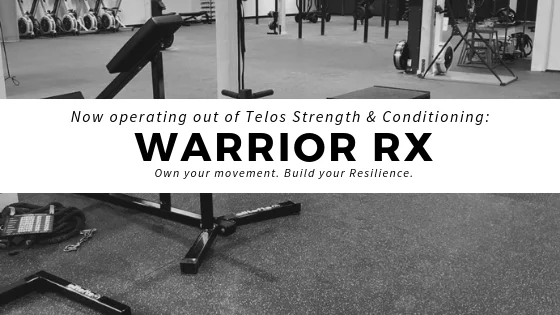Personalized. Purposeful. Performance. These are the pillars of Warrior Rx, a fee-for-service physical therapy clinic operated out of Telos Strength & Conditioning. When I graduated with my doctorate in physical therapy I never imagined opening my own business, let alone a fee-for service clinic. (Fee-for service means I do not bill insurance directly, but provide you with a bill you submit to your insurance.) I quickly realized that irregardless of how passionate I was about physical therapy there were 2 problems: 1. A typical clinic’s atmosphere and equipment does not lend itself to a performance mindset or appropriate progressions with weight, 2. An insurance based model limited my ability to provide my patient’s the care they deserved and needed to achieve their goals. So I’m bringing the physical therapy directly to you at Telos!
Why I don’t accept Insurance:
I chose to open a fee-for-service clinic because it allows me to provide the highest quality of care to my patients with no impact from a 3rd party who knows nothing about your case or goals. In an insurance based clinic, reimbursement has a significant impact on the care you receive. In current healthcare, reimbursement for physical therapy is poor, resulting in companies utilizing several strategies to stay afloat. Some of these include:
-
Use of support staff (aides/technicians) to extend care with minimal training or understanding of why the patient is performing the exercise. This can limit the effectiveness of an exercise and lead to difficulties modifying interventions to fit your individual needs. It often ends up with the support staff taking you through simple exercises that may leave you wondering “why am I doing this?” You’re also likely to hear this question at your next visit from your physical therapist as they were unable to directly assess your performance: “How did you tolerate the exercises last time?”
-
Limited appointment times. It’s simple, see more patients per day, make more money. Maybe you’ve been to physical therapy and you received 15-20 minutes with your actual physical therapist and the rest of your appointment was spent with support staff or on modalities.
-
Use of passive modalities with limited evidence to support effectiveness, but are still a reimbursable code to your insurance…Enter e-stim. *facepalm*
-
More frequent visits per week. Now, this occurs for 2 reasons. One is to maximize profit, but secondarily because your physical therapist can only spend 15-20 minutes with you, the care you are receiving is less efficient and requires you to be seen more often to achieve the same outcome.
Beyond reimbursement, insurance companies often determine how many visits you need and what period of time you have to get better. According to insurance companies, if you can sit and do you activities of daily living then further care is not “medically necessary.” Pain with overhead lifts, pull-ups or kettle bell swings are not included in your activities of daily living, though we know that these types of activities allow you to be resilient to life’s daily stress.
Is this a fault of the physical therapy clinics? No, its a failure of our current “health”care system. Healthcare in the United States is amongst the poorest in industrialized nations. Why? It operates in a sickness model versus a wellness model. Here’s an example:
-
You have shoulder pain.
-
You go to your PCP who says STOP EXERCISING…gives you muscle relaxers, Tylenol and says come back in 4 weeks.
-
Go back to PCP who says go see the orthopedic specialist
-
You wait 2-4 weeks to see the orthopedic specialist who orders some imaging and says you have rotator cuff tendinitis or impingement. Maybe they give you an injection. Then maybe, sends you off to physical therapy.
Now you are 2 months in to this shoulder pain and at a clinic where maybe the clinician knows what a Push Jerk is, but probably tells you to not do any overhead movement for awhile. You’re frustrated and de-conditioned. After 4 years of this scenario, I decided to take the leap and open up Warrior Rx to provide the highest quality care to the active and athlete populations. You’re already investing in your health and you deserve a clinician who’s in the trenches with you, someone who understands the movements and demands of your lifestyle.
Differences at Warrior Rx:
-
Hour long appointments
-
1-on-1
-
No support staff
-
We meet in your environment with your equipment
-
An emphasis on progression and loading of movement
-
Self management strategies to help you build your resilience
-
No surprise bills later in the mail
You have different goals than your insurance plan, and this fee-for-service model allows us to provide you the rehabilitation you need. The goal at Warrior Rx is to be more efficient with your time and purposeful with your rehabilitation: your direct access musculoskeletal care provider.
All that said, you are likely not stuck with 100% of the bill and can use your out-of-network benefits for reimbursement directly from your insurance company by submitting the provided superbill. You also may use your FSA or HSA money to pay for our services. But we also understand that this model is not for everyone, and we are happy to talk to each person who wants to schedule to make sure we are the best fit for your goals and needs. We prioritize YOU above your insurance companies requirements to help you get back to doing what you love. Please see our website at www.warriorrxtucson.com for more information regarding scheduling or email me directly at abigailbird@warriorrxtucson.com!
Own your movement. Build your Resilience.
Warrior Rx
Dr. Bird will be beginning her practice at Telos on FEBRUARY 1st! Come check out what she offers and how she can help you!

